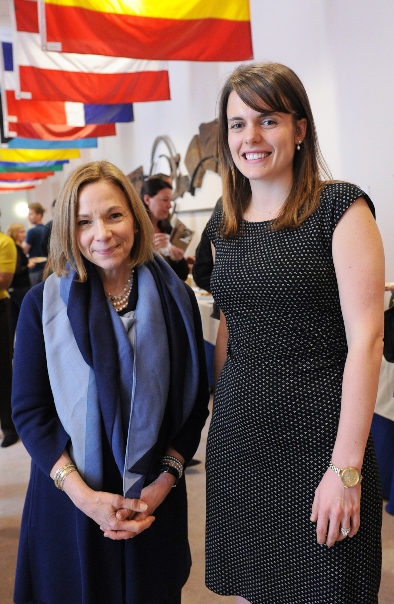Communicating Your Research
Doctoral research is hard work. Presenting your work to a non-specialist audience in three minutes or less might be even harder.

Jacobson with Dean Lisa Tedesco
Melanie Jacobson, a doctoral student in Epidemiology, won the 2016 3MT competition, which challenges students to present their research to a non-specialist audience in three minutes or less. “I think it’s important for scientists to be able to explain their research to different audiences, and not just those with technical training. Furthermore, I think this is especially important for scientists working in public health. I want my work to be relevant and understandable to communities, other interested parties, and the public at large,” says Jacobson.
Jacobson’s work is actually quite complicated. Says Jacobson, “Brominated flame retardants, such as polybrominated biphenyls (PBBs) and polybrominated diphenyl ethers (PBDEs), are persistent chemicals that are used in the manufacturing of many consumer products, and are ubiquitous in the environment and in human media. My research examines the effects of exposure to PBBs and PBDEs on thyroid function and its sequelae among two highly exposed and vulnerable populations that have not previously been studied: young children and reproductive-aged women. Beyond investigating the thyroid impacts of exposure to these common environmental chemicals, this research will also contribute to our understanding of how thyroid function influences menstrual and reproductive physiology.”
So how did Jacobson explain the nuances of this project in three minutes or less?
The Laney Advantage
Aside from her participation in the 3MT competition, Jacobson has also taken advantage of the many career planning and professional development resources offered by Laney.
“LGS programs and support have been instrumental to my success, learning, and development at Emory. For example, through using Professional Development Support Funds (PDS), I have been able to attend many conferences and present my work with colleagues in the field over the last four years. I have also completed the doctoral ethics training through the Jones Program in Ethics, which has enhanced my understanding of the ethical implications of my research, as well as the TATTO program, which provided me with a strong foundation of teacher training. These experiences have not only enabled me to become a productive member of the Emory community, but have provided me the opportunities to build essential skills and training upon which I will be able to launch a scientific career in the future.”